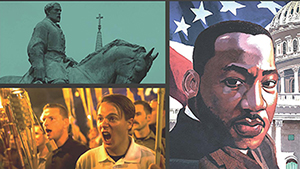What is America’s Past?
 |
|
Weighing the importance of learning the truth of America's past will be historians (left to right) Richard Hamm, Kendra Smith-Howard, Frankie Bailey and Ryan Irwin. |
ALBANY, N.Y. (September 22, 2017) — Probably few would argue that U.S. politics is in a sad state these days. Part of that may be due to the fact that Americans collectively are increasingly disconnected from their past.
Five UAlbany faculty members seek remedies, and so think there is no better time than now to reflect on the way we teach U.S. history. They have scheduled a roundtable discussion, “'You Will Not Replace Us': Why Teaching and Learning about the American Past is More Important than Ever,” for Thursday, Sept. 28, at 11:30 a.m. in the Campus Center West Boardroom.
The participants will be historians Richard Fogarty, an associate dean for General Education who will act as facilitator, Frankie Bailey, Richard Hamm, Kendra Smith-Howard and Ryan Irwin. In addition to debating the history lessons of the past, they will consider the values that inform the general education curriculum at UAlbany and engage the audience in an open conversation about recent events.
Ryan Irwin, who has researched and published works on global governance and decolonization, said that America’s current political climate isn’t a problem of mere confrontation or conflict. “We've had a two party system since the 1790s, and federalism, by design, nurtures confrontation,” he said.
“If you and I invented a time machine and invited James Madison — the Constitution's architect — to analyze America today, he'd probably say that conflict is necessary in a healthy democracy. We need solid debates so we can grow, and you can't have a real debate without disagreement. But he’d surely recognize that we haven't been good stewards of his ideas.”
 |
|
Images that spark current emotions in America will be reflected at the roundtable discussion on Thursday in the Campus Center West Boardroom. |
Irwin believes, first of all, that the rule of law is being eroded, no matter when the trend began. “Today’s examples are uncomfortably numerous, ranging from the Senate's treatment of Judge Merrick Garland to the Justice Department's claim that police officers should disregard federal courts.”
Secondly, Irwin believes America’s standard of truth has declined. “Again, in Madison's eyes, conflict defined American politics, but arguments required evidence and reason. In other words, not every opinion is supposed to get equal airtime in a vibrant democracy. I suspect Madison would give us failing marks that front. Fake news has become something of a punchline, but it's a real problem.”
The goal of teaching history at UAlbany, said Irwin, the department's undergraduate director, is to ensure excellent preparation for students in the discipline and to lift their minds toward independent thought. “The people who teach history at UAlbany want students to obtain gainful employment upon graduation. So, when we evaluate students, we look for superb writing, in-depth research, and analytical precision. Knowing the past is useful, but thinking like an historian is essential — that's our guiding light.
“Second, we want our students to be original thinkers and good citizens. You can't be original if you don't know what came before you, and it's hard to be a good citizen if you think you're the only person in the room. Students are surrounded by so many bad role models today — from television and the internet to industry and government. Our job is to create a space for them to ask questions that matter.”
The recent U.S. conflicts over race, such as in Charlottesville, will be addressed by the panel, and touch upon the question of the historian judging morality today and over time.
“As I often tell my students, I have absolutely no idea if there is such a thing as capital ‘T’ truth,” Irwin said. “I don't get paid enough to deal with that question. However, I do know that there is a difference between an elegant interpretation — supported by well-digested evidence and clear thinking — and an ugly argument.
“We should also call out ugliness when we see it. I mean, is opposition to racism a subjective value? It wasn't when I was a kid, and my convictions about antiracism definitely, and unapologetically, organize my teaching priorities.”
What of the teacher expressing moral judgement over historical figures? “This is an issue that historians grapple with constantly, and I hope it comes up during the roundtable,” he said. “On the one hand, historians are careful not to use today's moral standards to judge the people they write about, and condescension has no place in the classroom. On the other hand, the past has lessons, which historians are obliged to share.
“So, how do we balance these dual impulses? Carefully!”
![]() For more news, subscribe to UAlbany's RSS headline feeds
For more news, subscribe to UAlbany's RSS headline feeds
A comprehensive public research university, the University at Albany-SUNY offers more than 120 undergraduate majors and minors and 125 master's, doctoral and graduate certificate programs. UAlbany is a leader among all New York State colleges and universities in such diverse fields as atmospheric and environmental sciences, business, education, public health,health sciences, criminal justice, emergency preparedness, engineering and applied sciences, informatics, public administration, social welfare and sociology, taught by an extensive roster of faculty experts. It also offers expanded academic and research opportunities for students through an affiliation with Albany Law School. With a curriculum enhanced by 600 study-abroad opportunities, UAlbany launches great careers.


